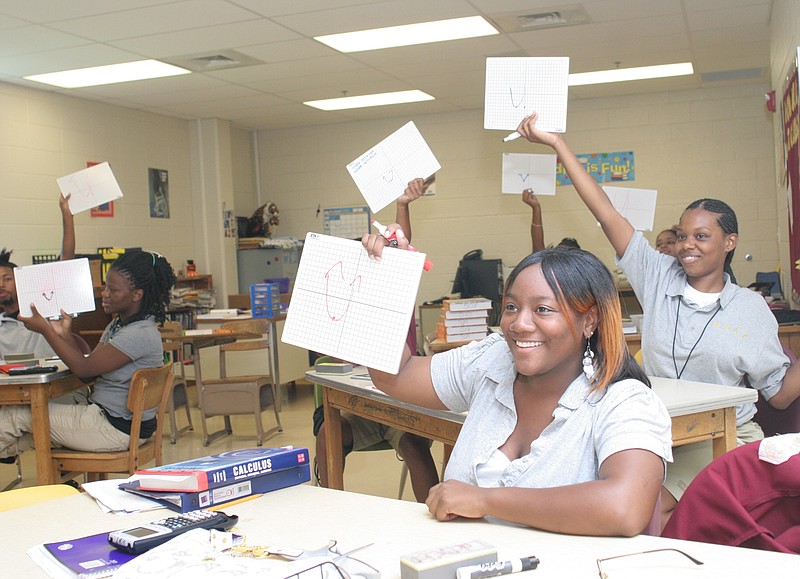UnifiEd, a local nonprofit education advocacy organization, says it has a plan for addressing inequities in Hamilton County Schools and will launch it on Aug. 1.
The inequities in local public schools exist, it says, in resources, experienced teachers, advanced courses, discipline, poverty, demographics and HOPE scholarship eligibility, among other things.
The plan, Action Plan for Educational Excellence (APEX, the top or highest part of something), will address the inequities and formulate a policy that will continually address them. Such a policy, organization officials said, will be knit together by a 27-member steering committee with three representatives from each of the county's nine commission/Board of Education districts. The organization then hopes county officials will implement the plan.
For years, federal, state and local officials, plus local foundations and interest groups, have offered or put in place plans that were supposed to do the same thing. Desegregation of schools - and forced busing, which began locally in the early 1970s, to help implement it - was supposed to do the trick. So was a plan as recent as the extra $11 million from the state that was given over the past three years to the district's iZone schools in an effort to improve their performance.
So we wish UnifiEd success. Like the organization, we wish every child had every advantage that the most advantaged child has. Unfortunately, that will never happen because that's not reality.
Every school having teachers averaging 13.1 years of experience is not reality. Every school matching the 2016 Hamilton County demographics of 73.9 percent white, 19.7 percent black and tinier percentages of Hispanics and Asian students is not reality. Every school achieving a student population with an equalized poverty rate is not reality. Every school having the exact dollar amount of resources is not reality. Every school graduating students with the same number of HOPE scholars is not reality.
Those things aren't reality because homes, parents and students are not monolithic. An inequity plan by a well-meaning organization will not provide a single parent in Alton Park the resources to move to a Macmansion in Ooltewah. A steering committee's best effort will not be able to make up for a father in prison and a mother on drugs. Implementing a document won't keep a street gang from trying to recruit a vulnerable student.
To be sure, Hamilton County is not what it was when forced busing began here in the early 1970s. Where it was rare to find 45 years ago, whites and blacks now live side by side in many suburban neighborhoods. The high schools in the upper middle class communities of East Brainerd and Ooltewah have, for example, non-white student populations of 25.6 percent and 33.5 percent, respectively.
The county also has a variety of private schools that didn't exist before forced busing and several that have been in existence for more than a century.
We won't know what UnifiEd has in mind until it launches its plan, but there are a few things we do know.
* Many experienced teachers, who have previously taught in struggling schools but now are comfortable in a high performing school, won't return to a struggling school. They'll quit or attempt to get a job in a neighboring county or a private school. Bless the ones who would move, but an attempt to equalize experience at the schools with forced transfers will not have overly positive results.
* Every school should have courses that challenge their students, but experience has shown that advanced courses offered at some lower-performing schools either have not drawn the students necessary to sustain the courses or the students haven't done well enough to allow their continuation.
* HOPE scholarship eligibility is set by the state. Students apply for one, and they are either eligible or they are not. If there is perceived inequity in the process, it is beyond the purview of the school district to change that.
All that said, we wouldn't discourage UnifiEd, because we believe there are changes that can be made to help address some of the inequities.
* The district previously has used incentives for new teachers to take jobs in struggling schools. A different package of incentives might be used to lure an experienced teacher from a high-achieving to a low-achieving school.
* We don't know whether such is possible, but a student working independently at an advanced placement level under the supervision of a teacher in a regular classroom might be one solution in a school where a full advanced placement course is impractical.
* Many students may not qualify for a HOPE scholarship because they do not apply for one. We believe school counselors probably encourage those students who are likely to qualify, but perhaps frequent checks and offers of assistance for students who might be on the cusp could put a few of them over the top.
* And school-based budgeting could help. All schools and students aren't created the same, and some do require expenses that others do not. The outlook shouldn't be that if one school gets something, another does not. School-based budgeting is a stab at eliminating that.
Again, we couldn't discourage UnifiEd in its quest for success for every student. We share that quest. But we believe plans must have a sound basis in reality for students to reach the apex.
